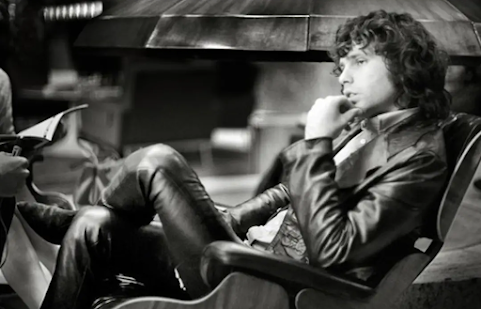THE DOORS' "THE SPY": A MORRISON'S ROCK BLUES POEM
The eighth track on The Doors' fifth album, "Morrison Hotel", released in February 1970, is "The Spy" (here's the link), a composition attributed to Jim Morrison, the band's lead singer.
Written in 1969, probably between summer and autumn, based on a poem by
Morrison himself, it was recorded alongside other album tracks in November of
that year.
The song has the peculiar virtue of taking the dynamic musical genre of
rock blues and turning it into a slow tempo.
In fact, the verse unfolds like an atmospheric blues imbued with guarded
mystery, as if it were carrying a hidden secret.
The languid riff of Robby Krieger's electric guitar, played without
distortion, guides and traverses this first section, taking elusive steps that
end with an enigmatic vibrato.
This instrumental technique, where the guitar crosses the verse by
inserting vibrato into its phrasing, had already appeared in The Doors'
discography.
Krieger had previously used it on "My Eyes Have Seen You", a
track from the band's second album, "Strange Days", released two
years and nine months earlier. However, the context was very different from
that of "The Spy", with the vibrato being used at the beginning
rather than the end of the guitar phrase.
The short chorus, a variation of the verse itself, brings us into the
realm of Rock. Its sonic power grows thanks to Manzarek's mighty piano chords
and the relentless, resolute rhythm of the drums (listen from min. 0:57 to min.
1:05).
This Rock feel continues in the middle eight, where slight guitar
distortion fills the gaps in the arrangement (listen from min. 1:50 to min. 2:15).
The combination of the 1970s-style blues verse and rock chorus and
middle eight allows us to experience a Rock-Blues song immersed in the shade of
an overall moderately paced rhythm.
This musical peculiarity (in fact, most rock-blues have a sustained
rhythm) is elegantly wrapped in the tune's inquisitive and mysterious
atmosphere.
In the verses that make up the song's lyrics, Morrison mysteriously
reveals how he knows the secrets, actions, preferences, fears and desires of
his loved one without being seen or heard.
This concise declaration is conveyed through the fascinating metaphor of
the protagonist describing himself as a spy operating in the house of love.
His voice matches the scene sketched by the words perfectly, whispering
seductively in the verse before rising forcefully and deepening in the chorus
and middle eight.
Meanwhile, John Densmore hits the snare drum with brushes instead of
traditional drumsticks, while session musician Ray Neopolitan plays his
electric bass with an enigmatic air of circumspection, searching for a double
bass-like sound.
The result is a rhythmic accompaniment that openly acknowledges its jazz
influences while maintaining the blues as its primary musical reference.
In the coda, the song slowly fades away with subtle piano and electric
guitar solos on Morrison's final veiled warning: “I'm a spy / I can see / What
you do / And I know'.
An unusual and daring alternative version of 'The Spy' also exists from
the “Morrison Hotel” sessions. Surprisingly, it has a carefree, jolting tempo.
Slightly faster than the master take chosen for the vinyl release, it conveys less intense emotions and is carried by electric bass and drums into a country-rock atmosphere. This atmosphere is unusual for The Doors and is in blatant contrast to the lyrics (here is the link to the alternative version).
A few weeks after recording the song, in January 1970, the band began a
long tour in support of the album “Morrison Hotel”, which ended on 22 August
1970.
"The Spy" was also included in the set lists of these concerts. For example, here is the link to a version of the song that The Doors performed in Boston on 10 April 1970.
In this case, the performance time is extended to five minutes and forty
seconds, and the rhythm section — consisting of drums and a Fender Rhodes piano
bass played by Manzarek with his left hand — is slightly modified.
The outcome is an obstinate progression featuring a slightly more pressing
rhythm than the album version and a pulsating beat accompanying Morrison’s
vocal.
The singer’s vocals are less polished and persuasive here than on the
album track; at times, his singing ripples with a certain harshness, and he comes
across more adamant than charming.
'The Spy' remains one of Jim Morrison's least celebrated compositions.
Nevertheless, it offers an original take on the rock blues genre, allowing us
to appreciate the sinuous and passionate inner surges of a timeless musician
and poet.
P.S.: My book "The Doors Through Strange Days"- The most comprehensive journey ever made through The Doors' second LP, is out and available on Amazon.com, uk, mx, ca, it, etc.
Here’s a link:




Comments
Post a Comment